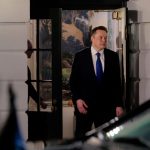Elon Musk issued a grim warning of the “very real” risk to the United States only hours after Vice President Kamala Harris made a scathing statement about the Venezuelan election. His statements epitomize heightened concerns over rising geopolitical tensions that are now putting U.S. interests and world stability under threat. It all began when Vice President Harris commented on the Venezuelan election, which she condemned as “shameful” and representative of deeper democratic and human rights problems. Her remarks, critical of the Venezuelan electoral process and regime, elicited a great deal of backlash from many quarters, most notably from high-profile individuals like Elon Musk. Musk’s reaction underlines a more extensive debate about the role that U.S. political leadership plays in international affairs and any possible consequences for what they say on global relations.
His warning underlined the tension between diplomatic rhetoric and the complex realities of international politics, wherein statements from influential leaders may have far-reaching implications. For years, the Venezuelan election has been controversial, marked by accusations of electoral fraud, opposition voices repressed, and democratic principles violated. The international community stands divided on the way forward—pitting those who believe in hitting the Venezuelan government with sanctions and other such measures against those who are more for diplomatic engagement and support for the democratic movements on ground.
The very real risk that Musk has warned of suggests he believes Harris’s remarks might fan already existing tensions or create new challenges for the U.S. and its allies, including potential diplomatic fallout, heightened regional instability, and other such unintended consequences against the interests of the United States in Latin America and beyond. In the globalized context of today’s world, statements and actions from political leaders can easily mold international perceptions and relations. The declaration by Harris on the election in Venezuela might be causing tense U.S. relations with other countries that may have different perspectives on the situation in Venezuela.
That strain might encumber efforts to address broader regional issues and may affect strategies of U.S. foreign policy. Concerns raised by Musk also mirror growing sensitivity to global interconnectivity and careful consideration to political statements that may impact. Business and technology are influenced much by international development, and geopolitical tension can cause disruption to markets, supply chains, and investment opportunities, which is a large concern. The dilemma that has characterized how to act towards Venezuela reflects the wide-ranging complexity of international diplomacy and the challenge of reconciling ethical concerns with the mundane political and economic realities involved. While the defense of democracy and human rights is of immense importance, the way in which this is pursued must be careful and look at the consequences that might arise in terms of international stability and American interests.
The “shameful” designation that Harris applied to the Venezuelan election reflects a broader critique of the current Venezuelan government and its handling of electoral processes. That is squarely in line with the strictures expressed by many human rights organizations and international observers who have weighed in on the quality of the election and the general political atmosphere in Venezuela. In the broader context, Musk’s warning pointed toward a nuanced approach that should characterize international diplomacy. Political leaders and public figures need to use deeply weighed words and actions in such a way that the impact of the words and acts shows not only in immediate times but also long-term impacts on global relations and stability.
This response to Harris’s comments further epitomizes the polarized nature of international politics and the disparate outlook toward the best ways to address such problems of democratic governance and human rights. There might be a divergence in ideas among the various stakeholders—the governments, the businesses, and the organs of civil society—concerning what would be an effective means to effect change and make right some of the injustices. The intervention of Musk in a debate of this kind underlines the powerful role influential leaders and individuals may play in shaping public discourse and having a say in policy decisions.
Being an icon of the technology and business worlds, Musk’s views have a weight of their own, influencing any wider discussion concerning international relations and United States foreign policy. In summary, Elon Musk’s warning about the “very real” risk following Vice President Kamala Harris’s condemnation of the Venezuelan election reflects broader concerns about implications for political statements on global stability and US interests. Indeed, at the very heart of international diplomacy are careful considerations of what public statements and actions can do. This places balance in responding to democratic and human rights matters with geopolitical risk management.







